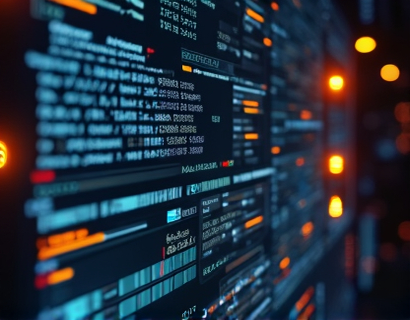AI and Crypto: Transforming Digital Finance with Intelligent Solutions for the Future
The intersection of artificial intelligence (AI) and cryptocurrency is revolutionizing the landscape of digital finance. This fusion of technologies is not only enhancing the efficiency and security of financial transactions but also opening up new avenues for innovation and growth. As we delve into this transformative era, it's essential to understand how AI is reshaping the crypto world and what the future holds for these intelligent solutions.
Enhancing Security with AI
One of the most significant benefits of integrating AI into cryptocurrency is the enhancement of security measures. Traditional financial systems rely heavily on static protocols and rules to detect and prevent fraudulent activities. However, these systems often struggle to keep pace with sophisticated cyber threats. AI, on the other hand, brings a dynamic and adaptive approach to security.
Machine learning algorithms can analyze vast amounts of data in real-time, identifying patterns and anomalies that indicate potential security breaches. For instance, AI can monitor transaction patterns and flag suspicious activities with high accuracy, reducing the risk of fraud and hacking. This proactive approach to security is crucial in a space where the stakes are incredibly high.
Improving Transaction Efficiency
AI is also playing a pivotal role in streamlining transaction processes. Traditional blockchain transactions can be slow and costly, especially during peak times when the network is congested. AI-driven solutions are addressing this issue by optimizing transaction routing and validation.
Smart contracts, powered by AI, can automatically execute transactions based on predefined conditions, reducing the need for intermediaries and speeding up the process. Additionally, AI can predict network congestion and dynamically adjust transaction parameters to ensure faster and more efficient processing. This not only enhances user experience but also reduces transaction fees, making crypto more accessible and user-friendly.
Enhancing User Experience through Personalization
The crypto space is vast and complex, often overwhelming new users. AI-driven personalization is changing this by providing tailored experiences that cater to individual needs and preferences. Recommendation systems powered by AI can suggest crypto assets, trading strategies, and educational resources based on a user's behavior and interests.
For example, AI can analyze a user's trading history and market trends to recommend potential investments or alert them to market opportunities. Personalized news feeds and notifications can keep users informed about relevant developments in the crypto world, helping them make more informed decisions. This level of personalization not only improves user engagement but also fosters a more inclusive and user-friendly environment.
Robust Market Analysis and Predictive Insights
Market analysis is a critical component of successful crypto investing. AI algorithms can process and analyze vast datasets, including historical price data, news articles, social media sentiment, and economic indicators, to provide comprehensive insights and predictive models.
These insights can help investors identify trends, spot potential market turning points, and make more accurate predictions about asset prices. AI-driven trading bots can execute trades based on these insights, executing strategies with precision and speed that human traders might struggle to match. This not only enhances the decision-making process but also democratizes access to professional-level analysis, empowering individual investors.
Fraud Detection and Compliance
Regulatory compliance and fraud detection are ongoing challenges in the crypto industry. AI technologies are instrumental in addressing these issues by providing robust monitoring and compliance solutions. AI systems can continuously scan transactions and user activities for signs of illegal activities such as money laundering, tax evasion, and market manipulation.
Regulators can leverage AI to enforce compliance more effectively, ensuring that crypto platforms adhere to legal standards. This not only protects users and the integrity of the market but also builds trust in the crypto ecosystem. As regulatory frameworks evolve, AI will continue to play a crucial role in maintaining a balanced and secure environment.
Decentralized Finance (DeFi) and AI
Decentralized Finance (DeFi) is a rapidly growing sector within the crypto space, offering decentralized alternatives to traditional financial services. AI is enhancing DeFi platforms by improving risk management, optimizing lending and borrowing processes, and creating more efficient market mechanisms.
For instance, AI can assess creditworthiness in a decentralized manner, reducing the need for centralized credit bureaus and making financial services more accessible. Smart contracts enhanced with AI can automate complex financial operations, ensuring transparency and reducing the risk of human error. This synergy between AI and DeFi is paving the way for a more inclusive and efficient financial system.
Challenges and Considerations
While the integration of AI and crypto offers numerous benefits, it also comes with its own set of challenges. One of the primary concerns is the ethical use of AI. Ensuring that AI systems are transparent, fair, and free from bias is crucial to maintaining trust in the crypto ecosystem. Additionally, the computational resources required for AI operations can be substantial, raising questions about the environmental impact of these technologies.
Another challenge is the regulatory landscape. As AI and crypto continue to evolve, regulators must strike a balance between fostering innovation and protecting consumers. Clear and adaptive regulations will be essential to ensure that the benefits of these technologies are realized without compromising security or fairness.
Future Prospects
The future of AI and crypto is bright, with numerous exciting developments on the horizon. As AI technologies advance, we can expect even more sophisticated applications in the crypto space. For example, the integration of AI with quantum computing could lead to breakthroughs in cryptography, making financial transactions virtually unhackable.
Moreover, the rise of central bank digital currencies (CBDCs) combined with AI could redefine monetary policy and financial stability. AI-driven analytics can provide real-time insights into economic indicators, enabling more precise and responsive policy decisions. This could lead to more stable and resilient financial systems globally.
In conclusion, the merging of AI and crypto is transforming digital finance in profound ways. From enhancing security and transaction efficiency to personalizing user experiences and revolutionizing market analysis, the potential of these intelligent solutions is vast. As we move forward, it's essential to address the challenges and ensure that the benefits of this fusion are realized for the greater good.










































